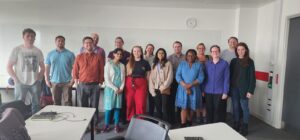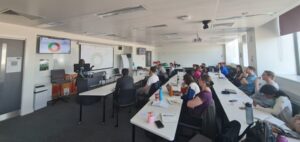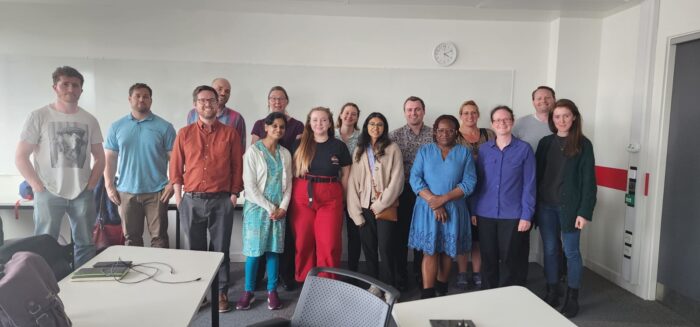Reflections from the 28th Sanitation Community of Practice (SanCoP) meeting
By Amita Bhakta and Ruth Sylvester

When we think about sanitation in the WASH sector, our thoughts often turn directly to the 3.6 billion people in low- and middle-income countries who, according to official figures, lack access to safely managed services. According to the Joint Monitoring Programme the UK has 98% access to safely managed sanitation, but when we delve deeper all is not as it seems. Certain groups are actively excluded from basic services altogether, such as Gypsy, Romany and Traveller (GRT) peoples, while others are more passively ignored, such as those experiencing homelessness, gig economy workers and boat dwellers. To explore this further, a group of interdisciplinary experts gathered at the University of Leeds on 23rd May 2023 at a Sanitation Community of Practice (SanCoP) meeting, to critically examine the state of sanitation in the UK.
A public or private concern? It depends on where, and who, you are
At the start of the day, we were welcomed by Dr. Sally Cawood (Lancaster University), Dr. Paul Hutchings and Ruth Sylvester [event chair] (University of Leeds), who introduced the themes of the day. As the UK is a fairly ‘new’ context within the international sanitation space, a variety of topics were included in the running order. These varied in severity of service failure and placement on the sanitation service chain.
First, we learned how water and sanitation spaces in cities across the UK and USA are being weaponised to further exclude already marginalised groups. Research conducted by Dr Katie Meehan, Co-Director of King’s Water Centre at King’s College London, painted a picture of how open defecation in London’s parks became a common practice during the COVID-19 lockdowns due to a lack of access to toilets (Meehan et al. 2023). The criminalisation of urination and defecation could be seen as akin to the criminalisation of survival itself. Signs appeared in public parks warning that “it is a park, not a toilet, go home if you need to go [to the toilet]” which demonstrated the invisibility of those with complex sanitation needs, in particular people who experience homelessness and face being ‘paywalled’ to use public facilities. It became clear through these insights that the way forward to support those experiencing homelessness in the global North requires WASH to be viewed as a public good, to ensure that the rights to sanitation for all can be fully realised.
Sanitation provision in cities such as Leeds in the north of England is also far from ideal. We learned about ongoing research by Grace Phiri at the University of Leeds, which highlighted the clear challenges faced as the unhoused populations increase and access to public toilets in the city centre decreases. People find themselves having to ‘negotiate’ access to toilets in shops and restaurants, often either being actively excluded or facing psychosocial barriers. Lack of access to public toilets in city centres also poses significant issues for floating populations and people who may need ‘immediate’ access to a toilet to manage issues such as incontinence, menstrual hygiene and the (peri)menopause, as well as other invisible conditions. Disappearing public toilets is clearly an issue in need of greater attention; recognising the impact is the first step.
In recent years, debates around realising the rights of workers to WASH in the global South have started to gather pace. During SanCoP the parallel UK case of food delivery and courier riders was revealed by Dr Victoria Habermehl. We learned how many had been treated with contempt and denied access to toilets by restaurants when on shift during the COVID-19 pandemic. Astonishingly, the only way that this could be overcome was through the provision of a letter by the UK Government’s Department for Transport for couriers to show to businesses, which stated that denying workers access to toilets was against the law. This letter was later withdrawn by the government after the acute phase of the pandemic, resulting in huge confusion and anxiety around realising the right to sanitation for courier riders. Far greater legislative measures are required to support courier riders, and others working in insecure settings, to enable sufficient access to sanitation services.

Legal(ised) discrimination against iterant populations
An appalling and increasing trend is the struggles Gypsy, Romany and Traveller (GRT) peoples face to access basic services. Regan John Eminson (Private consultant, previous affiliation; University of Sussex) educated the community of practice about how sanitation in GRT lifestyles is inseparable from cultural practices, and the wider discrimination they are subject to for seeking to continue their heritage. The 2022 Policing, Crimes, Sentencing and Courts (PCSC) act directly targets GRT peoples, restricting their movements and allowing severe punishments for stopping on roadsides. This directly affects their ability to access safe sanitation services and practice hygiene customs such as Mochadi (John, 2022).
Ruth Sylvester (University of Leeds) presented research conducted in collaboration with Dr Helen Underhill (Newcastle University) about boats dwellers’ sanitation experiences. Although not as severe or widespread as discrimination against GRT peoples, certain canal boaters who are part of Bargee Traveller culture & heritage feel their rights to move are being restricted by recent navigation authority policies. Participants in this research expressed how being able to move freely was fundamental to accessing and feeling well-served by sanitation services.
The role and positionality of researchers working with marginalised communities was discussed after these presentations, with an emphasis on the huge importance of Regan and Helen’s ‘insider’ perspectives. Parallels with sanitation research in the Global South can be drawn, highlighting the necessity of people from the communities themselves being centred in research designed and activities. Without this, it is difficult to ensure authentic representation or to facilitate the processes of trust building.
Can crisis become a turning point?
Discussions throughout the day highlighted the many significant, and often overlooked, issues faced by those in the UK when accessing sanitation. The final two presentations after lunch were on the topic of sewage pollution of rivers and the coast. This is a different kind of ‘service failure’, one that most keenly affects the environment and wild swimmers. We learnt that this affects other groups in various ways from James McKay (University of Leeds) who shared his experiences as a member of the Nidd Action Group (NAG). Dr Peter Cruddas (University of Portsmouth) presented his expertise from an industry perspective on the financing and functionings of the sewerage network in the UK (Usher, 2023).
Whilst there is significant focus on the challenges of realising the rights to sanitation in low- and middle-income countries, there is also a lot that contexts such as the UK can learn from them. By looking in the mirror at the state of sanitation in the UK, and how this differs across race, gender, class and ethnicity, let’s open up a dialogue and break down dominant narratives about the Global North vs Global South as we seek to truly achieve sanitation for all.
Acknowledgements
Thank you to all of the fantastic speakers for your insights, and to the organisers of the SanCoP meeting, Sally Cawood, Jonathan Wilcox and Christine Cambrook, and co-organisers Ruth Sylvester, Grace Phiri and Hannah Robinson for arranging such an insightful day. Thank you also to Barbara Evans and Paul Hutchings for hosting this meeting at the University of Leeds.
References
John, R. 2022. Human rights, discrimination and sanitation: A precarious reality for Travellers. 10 May. [Online]. Sanitation Learning Hub. Available from: https://sanitationlearninghub.org/2022/05/10/human-rights-discrimination-and-sanitation-a-precarious-reality-for-travellers/
Meehan, K. Beresford, M. Amador Cid, F. Avelar Portillo, L.J. Marin, A. Odetola, M. and Pacheco‐Vega, R. 2023. Homelessness and water insecurity in the Global North: Trapped in the dwelling paradox. Wiley Interdisciplinary Reviews: Water. 10(4): e1651.
Nidd Action Group. 2023. https://www.niddactiongroup.org/
Usher, M. 2023. Making Shit Social: Combined Sewer Overflows, Water Citizenship and the Infrastructural Commons. In: Wiig, A., Ward, K., Enright, T., Hodson, M., Pearsall, H., Silver, J. Eds. Infrastructuring Urban Futures: The Politics of Remaking Cities. Bristol University Press: Bristol, UK, pp. 109-136.
